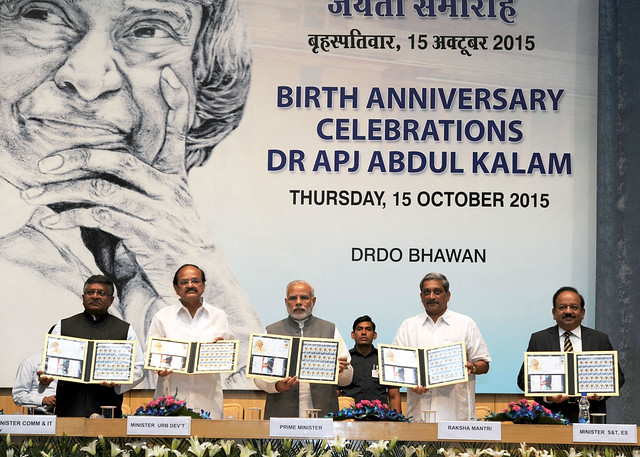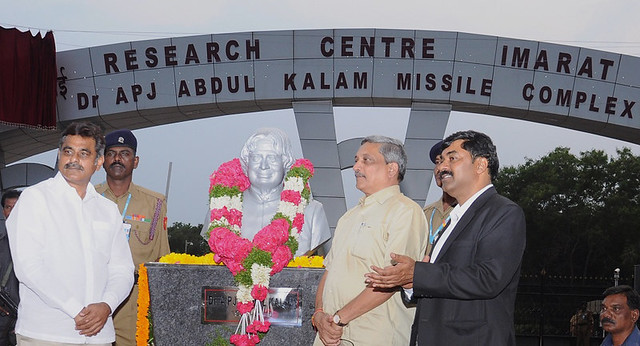Delhi/Hyderabad/Chennai: A grateful nation on Thursday paid homage to former president A.P.J. Abdul Kalam on his 84th birth anniversary by renaming a premier missile complex after him, unveiling the scientist’s statues and nostalgically recollecting his life and work.
Prime Minister Narendra Modi led the nation in paying rich tributes to Kalam, who passed away on July 27 following a cardiac arrest while delivering a lecture at IIM-Shillong.

PM Narendra Modi releasing the commemorative postal stamps on the former President of India, Dr APJ Abdul Kalam, on his 84th birth anniversary celebrations, at DRDO Bhawan, in New Delhi on October 15, 2015. Union Ministers, Manohar Parrikar, M Venkaiah Naidu, Ravi Shankar Prasad and Dr Harsh Vardhan are also seen.
Unveiling a bust of the late president in the Defence Research and Development Organisation complex in Delhi, Modi said the best tribute could be paid to Kalam by ushering in more innovations benefitting the world at large.
Modi announced a memorial to Kalam would be built at his birthplace Rameswaram in Tamil Nadu.
“The government has decided on the place where the memorial will be built – where he was born, where he was buried, in that village, to inspire the future generations. I have formed a committee of ministers to finalise the outline of the memorial,” the prime minister said.
Modi said India was making a place for itself in the world, and had huge scope for innovations.

Defence Minister Manohar Parrikar renaming Missile Complex after Dr APJ Abdul Kalam, at Research Centre Imarat (RCI), Hyderabad on October 15, 2015. The MP of Chevella, Telangana State, K Vishweshwar Reddy, and the Scientific Adviser to Defence Minister, Dr G Satheesh Reddy are also seen (Courtesy: PIB)
“India is making a place for itself in the world. At one time, the world saw India as a market; now they see us as co-traveller. The outlook of the world has changed, but will just economic prosperity – or just market – drive us? We have a huge scope for innovations,” he said, stressing that inspiration should be drawn from Kalam’s life to move towards innovations.
“Remembering Kalam Sahab is promoting innovation… What can we give to the world while remembering Kalam Sahab?” he said.
The prime minister said the DRDO should organise seminars for innovators, young scientists, people with scientific temper, students and young scientists.
Modi called for innovations in fields like cyber security, housing, interlinking of rivers, reducing grain wastage and climate change.
Earlier, Modi tweeted: “Salutations to Dr. APJ Abdul Kalam on his birth anniversary.”
In Hyderabad, India’s prestigious missile complex was renamed as Dr A.P.J. Abdul Kalam Missile Complex, with Defence Minister Manohar Parrikar attending the rechristening ceremony.
TeIengana Chief Minister K. Chandrasekhar Rao called Kalam India’s “tallest leader after Mahatma Gandhi”.
Rao unveiled Kalam’s statue at the Defence Research and Development Laboratory (DRDL) in Hyderabad and recalled his close association with the southern city.
In Chennai, Tamil Nadu Governor K. Rosaiah said Kalam touched the hearts of each and every Indian.
Launching the Dr A.P.J. Abdul Kalam Students Federation of India, Rosaiah said Kalam always laid stress on inculcating noble thoughts, values, patriotism and desire to aspire in life.
“Our nation’s greatest strength is our youth. Wherever Kalam went, he laid stress on the need to empower the youth with knowledge and skills and for developing in them the spirit of creativity,” Rosaiah said.
The Tamil Nadu government, which had earlier announced that Kalam’s birthday would be celebrated as ‘Youth Inspiration Day’, organised several events across the state.
Kalam was born and raised in Rameswaram and studied physics and aerospace engineering.
He was a scientist and science administrator for four decades, mainly at the DRDO and the Indian Space Research Organisation and was closely involved in India’s civilian space programme and missile development efforts.
Kalam was the 11th president of India during 2002-07.
